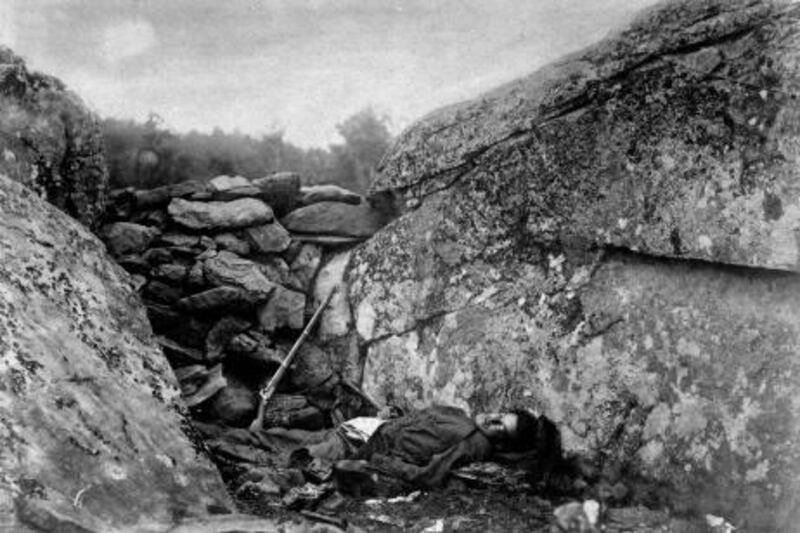NEW YORK // New York provided more soldiers, factory work and even horses than any other state in the Union during the US Civil War, but has decided not to commemorate the war's 150th anniversary because of budget deficits.
That is not sitting well with some who believe they have a duty to remember the war that nearly tore the country apart.
"One could say New York's contribution to the war saved the Union and freed slaves," said a state assemblyman and historian, Jack McEneny, a Democrat. "I feel in a sense it's a moral duty of our generation to give thanks and recognition to those who kept the Union together and freed people out of slavery."
Mr McEneny plans to introduce an amended version of a bill vetoed last fall by the former Democratic governor, David Paterson, to create a commission to recognise the sesquicentennial anniversary and promote historical tourism.
The US president, Barack Obama, is expected to touch on the federal government's financial woes in his State of the Union address tonight while New York and other states are also feeling the pinch.
New York state is facing a massive budget deficit estimated at about $10 billion (Dh36.7bn) stemming from high jobless rates and lower tax revenues, meaning many legislators are focused simply on providing people with health and education services. Mr McEneny says that is why his bill calls for the 14 members of the proposed commission, who would be tasked with envisioning the Civil War celebrations, to work for free.
"Commemorative events wouldn't only be a mark of respect but also create economic potential because festivals bring people together and they spend money," he said.
George Maziarz, a Republican state senator, said he was among those in his party who would support Mr McEneny's campaign for the state's newly elected governor, Andrew Cuomo, also a Democrat, to back the new bill.
"There is interest in such a major event in our country's history all over the state and it could be a great tourist attraction," Mr Maziarz said.
More Americans died in the four-year Civil War than in all of the country's subsequent wars including the first and second world wars.
It began after 11 Southern states that allowed people to own slaves seceded from the United States to form the Confederate States of America, although some historians argue the war was about states' rights versus centralised government as slavery.
The fighting started on April 12, 1861, with the bombardment of Fort Sumter, an outpost of the US military, in South Carolina by Confederate troops.
Until the war ended in 1865, Confederate troops fought pitched battles with Union forces from free states where slavery had been abolished and several slave states known as the border states.
About 600,000 people died, or two per cent of the population, including about 50,000 New Yorkers.
The campaign for the anniversary to be marked in New York by parades, discussions and dinners includes not only politicians, but also academic and amateur historians and educators.
Alan Singer, a professor of secondary education at Hofstra University, wrote on the Huffington Post website in a column exploring the state's complex Civil War history, such as a call by New York's pro-slavery mayor at the time for the city to secede with the south: "Whatever the state and city ultimately decide to do, teachers should use the anniversary to involve students in exploring the complexity of history and to challenge historical myth making."
Other states are already gearing up for major Civil War events. Gettysburg in Pennsylvania, for example, expects millions of people in 2013 for events marking the 150th anniversary of the battle in which the Union repelled the Confederacy's most northern attack.
However, the Civil War continues to prove controversial in southern states, where many white descendents of Confederate supporters refer to it as the "war of northern aggression".
Last month, the National Association for the Advancement of Coloured People (NAACP), a civil rights group for ethnic minorities, criticised the "offensive" tone of some Civil War remembrance events in the South.
A secession ball was held in Charleston, South Carolina, in which elected officials dressed up in period costumes and listened to a reading of the Ordinance of Secession, the document drafted and ratified in 1860 and 1861 by the states seceding from the United States of America.
Lonnie Randolph, the president of the South Carolina state conference of the NAACP, said he was concerned anniversary events in the South could lead to praise for those who fought to preserve slavery.
"We're still fighting the Civil War here in South Carolina," he told local newspapers. "South Carolina still wants to secede."
Kenneth T Jackson, a history professor at Columbia University in New York, said that while Americans born and living in the South absorbed Civil War history as part of their "DNA", New Yorkers historically tended to look more to the future.
"For lots of complicated reasons, the South is more interested in the Civil War than the North," he said.






